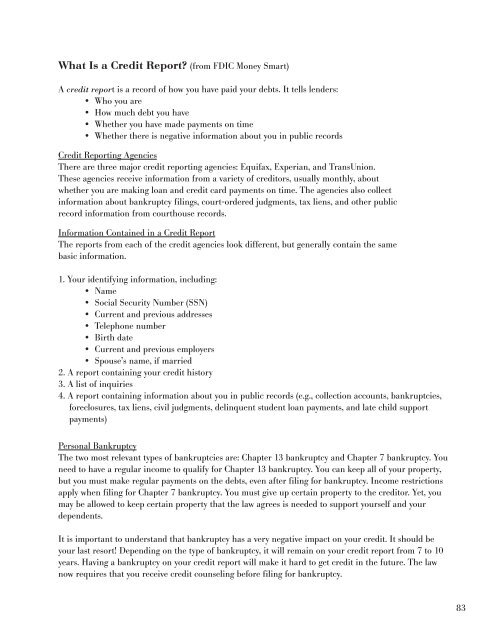Tips and Tools For Financial Success - Newton Free Library
Tips and Tools For Financial Success - Newton Free Library
Tips and Tools For Financial Success - Newton Free Library
Create successful ePaper yourself
Turn your PDF publications into a flip-book with our unique Google optimized e-Paper software.
What Is a Credit Report? (from FDIC Money Smart)<br />
A credit report is a record of how you have paid your debts. It tells lenders:<br />
• Who you are<br />
• How much debt you have<br />
• Whether you have made payments on time<br />
• Whether there is negative information about you in public records<br />
Credit Reporting Agencies<br />
There are three major credit reporting agencies: Equifax, Experian, <strong>and</strong> TransUnion.<br />
These agencies receive information from a variety of creditors, usually monthly, about<br />
whether you are making loan <strong>and</strong> credit card payments on time. The agencies also collect<br />
information about bankruptcy filings, court-ordered judgments, tax liens, <strong>and</strong> other public<br />
record information from courthouse records.<br />
Information Contained in a Credit Report<br />
The reports from each of the credit agencies look different, but generally contain the same<br />
basic information.<br />
1. Your identifying information, including:<br />
• Name<br />
• Social Security Number (SSN)<br />
• Current <strong>and</strong> previous addresses<br />
• Telephone number<br />
• Birth date<br />
• Current <strong>and</strong> previous employers<br />
• Spouse’s name, if married<br />
2. A report containing your credit history<br />
3. A list of inquiries<br />
4. A report containing information about you in public records (e.g., collection accounts, bankruptcies,<br />
foreclosures, tax liens, civil judgments, delinquent student loan payments, <strong>and</strong> late child support<br />
payments)<br />
Personal Bankruptcy<br />
The two most relevant types of bankruptcies are: Chapter 13 bankruptcy <strong>and</strong> Chapter 7 bankruptcy. You<br />
need to have a regular income to qualify for Chapter 13 bankruptcy. You can keep all of your property,<br />
but you must make regular payments on the debts, even after filing for bankruptcy. Income restrictions<br />
apply when filing for Chapter 7 bankruptcy. You must give up certain property to the creditor. Yet, you<br />
may be allowed to keep certain property that the law agrees is needed to support yourself <strong>and</strong> your<br />
dependents.<br />
It is important to underst<strong>and</strong> that bankruptcy has a very negative impact on your credit. It should be<br />
your last resort! Depending on the type of bankruptcy, it will remain on your credit report from 7 to 10<br />
years. Having a bankruptcy on your credit report will make it hard to get credit in the future. The law<br />
now requires that you receive credit counseling before filing for bankruptcy.<br />
83




